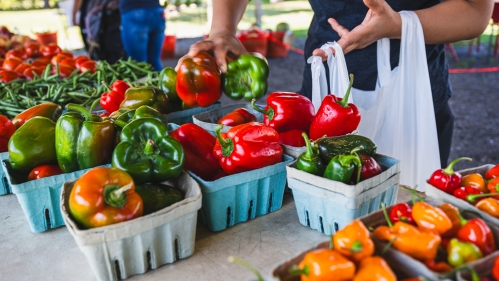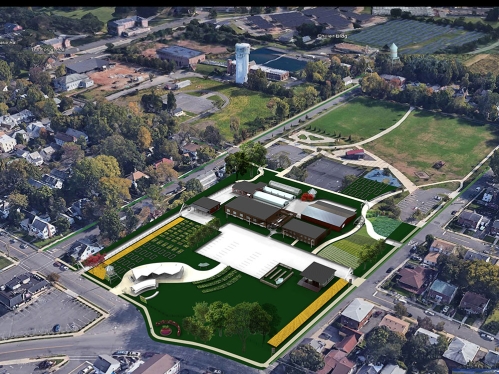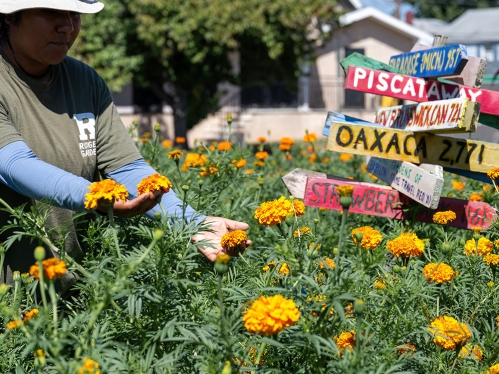
Accessible Market Pavilion
An accessible market pavilion ensures all community members, including those with mobility challenges, can easily access fresh, local produce in a welcoming environment.

Healthy Harvest Initiative
Join Us in Feeding the Future
The School of Environmental and Biological Sciences at Rutgers–New Brunswick has launched the Rutgers Healthy Harvest Initiative—a project focused on building a central hub for community food security. It is located at the current site of the New Brunswick Community Farmers Market and Esperanza Community Garden on Jones Avenue, a venue that is already a key part of our neighborhood. The Rutgers School of Environmental and Biological Sciences is in the process of a significant redesign to improve the space to make it more inviting and integrated into the George H. Cook campus, enabling students to get involved in hands-on cultivation of food.
Our goal is to support students, neighbors, and local partners by making fresh, nutritious, and culturally meaningful food more readily available. With year-round cultivation and educational programs, we want to give people the knowledge and confidence to cook healthy meals with what’s grown right here. At its heart, Healthy Harvest is all about building long-term community self-reliance—helping people grow, cook, and maintain their own access to good food.
Transforming the Future of Food Security
Rutgers Healthy Harvest Initiative aims to create a welcoming space and increase access to fresh, healthy food in the New Brunswick community.
The neighborhood served by the Healthy Harvest Initiative is a food desert. Developing this Rutgers property around Jones Avenue transforms the site into a hub that connects to other resources on the George H. Cook campus for year-round community food access through urban food production and preservation. Sustaining our partnerships with local churches, emergency food providers, local pantries, and food banks will enhance outreach and ensure that healthy food reaches underserved populations.

A Community in Need
The USDA estimates that 10.7% of New Jersey’s population is food insecure. This includes 262,260 children who live in homes without consistent access to adequate food in the Garden State.
As a hub for education, demonstration, and engagement, the initiative reaffirms our commitment to the New Brunswick community and our mission as the land-grant university of New Jersey to increase access to affordable, healthy, culturally appropriate foods.
Rutgers is at the forefront of community food security and urban agriculture, yet roughly 30% of students, both undergraduate and graduate, experience food insecurity. In 2024, Rutgers students and research farms donated roughly 135,000 pounds of food to local pantries and food banks. During the 2023-2024 market season, Rutgers farmers’ markets provided more than $50,000 worth of produce to food-insecure shoppers

Impact Initiatives

Accessible Market Pavilion
An accessible market pavilion ensures all community members, including those with mobility challenges, can easily access fresh, local produce in a welcoming environment.

Mobile Market Vehicle
A mobile market vehicle expands food access by bringing healthy, affordable options directly to underserved neighborhoods and rural areas.

Renovation and Repurposing of Existing Growing Spaces
Revitalizing existing growing spaces maximizes current infrastructure, promotes sustainability, and boosts year-round food production.

Commercial Teaching Kitchen
A commercial teaching kitchen empowers individuals with practical culinary skills, nutritional education, and opportunities for food-based entrepreneurship.

New Production Technologies
Innovative growing technologies increase efficiency, conserve resources, and allow for year-round cultivation, regardless of climate conditions.

Student Internship Opportunities
Internships provide students with hands-on experience in agriculture, business, and food systems, building valuable career and life skills.

Community Classes
Offering community classes fosters lifelong learning, improves public health, and strengthens local food systems through shared knowledge and engagement
How Can I Get Involved?
If you are interested in learning more about ways to support or get involved with the Healthy Harvest Initiative, please contact Gabrielle Peterson, Senior Director of Development.
